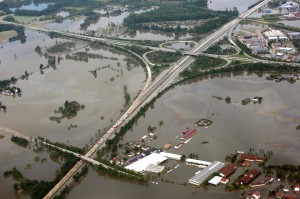Germany steps up evacuations along flood-hit river

In this aerial view the interchange of highway A92/A3 near Deggendorf, southern Germany is flooded by Danube river on Sunday June 9, 2013. Thousands of people have been evacuated from their homes in a region of eastern Germany where the Elbe river has flooded and burst through a dam, officials said Sunday. AP PHOTO/DPA, WOLFRAM ZUMMACH
MAGDEBURG, Germany—German authorities urged 15,000 more people to flee their homes in a city on the swollen Elbe river Sunday as central Europe’s worst floods in a decade also threatened Hungary after causing havoc in the Czech Republic and Austria.
A torrent of flood waters in Germany has turned vast areas into a brown water world, sparked a mass mobilization of emergency workers and caused billions of euros in damage in what one lawmaker termed a “national catastrophe.”
Rescue helicopters criss-crossed the sky and military armoured personnel carriers rumbled through the flood zone, where thousands of troops, firefighters and volunteers were frantically building up flood defenses with sandbags.
Across central Europe, the floods have killed at least 18 people, including 10 in the Czech Republic.
The German city of Magdeburg urged 15,000 residents to leave the east bank of the river, where an almost 7.5-meter (24 feet) peak—up from the normal level of two meters—was expected to strain saturated dikes for the next few days.
Article continues after this advertisement“We hope that the dikes will withstand the pressure over the coming days, but we can’t be 100 percent sure,” said fire brigade spokesman Andreas Hamann, one of 1,200 emergency staff working around the clock in the area.
Article continues after this advertisementThe move was described as a precaution, but a city spokesman said “people really are supposed to leave” in face of the danger. In all, 23,000 people in and around the city have been told to evacuate this weekend.
Soldiers in Magdeburg were also struggling to save a power installation in the harbor area, as water damage would not only knock out electricity to tens of thousands of homes but also to water pumps running at full tilt.
Tensions eased in cities upriver along the Elbe and its tributaries, including Dresden, Halle and Bitterfeld, where many evacuation orders were lifted and people returned to start clearing out their mud-caked homes.
The water level in Magdeburg was higher than during “once-a-century” floods of 2002, local authorities said. Magdeburg lies downriver from where the Saale river spills into the Elbe, creating a water surge a record 40 kilometers (25 miles) long.
Further downstream, towns including Lauenburg and the village of Hitzacker in Lower Saxony were preparing for the peak to hit in coming days.
Regional rains have also severely swollen the Danube, hitting southern Germany, especially the city of Passau, which has moved from alert to clean-up mode.
The deluge has sparked massive emergency responses in Austria, Slovakia and in Hungary, where waters reached a new record in Budapest on Sunday.
The capital’s mayor sought to ease concerns, saying water levels were stabilizing, although about 1,200 people had been evacuated along the river.
“Budapest is not at risk of a catastrophe, the level is not expected to rise significantly,” Mayor Istvan Tarlos said, adding that leaking dykes had been fixed.
“Of course anything can happen, but we have every reason to believe that Budapest will survive its biggest flood of all time,” said Imre Pesti, head of the city’s defense team.
Authorities said Budapest flood barriers are high enough to protect the capital, where the river was forecast to peak at 8.95 meters later Sunday.
In Germany, President Joachim Gauck visited flood-hit areas, where in vast areas only roofs and tree tops stick out of the water and the only access is by boat or helicopter.
“One cannot imagine how much remains to be dealt with,” he said.
Adding to tensions was a threat to attack dikes from a group calling itself the “Germanophobic Flood Brigade.” Aerial and ground surveillance had been stepped up, said Saxony-Anhalt state interior minister Holger Stahlknecht.
Ironically, the sun was shining above most of Germany’s flood zone, forcing the thousands packing sandbags to seek supplies of sun block and insect repellent.
However, more rains were expected by Monday in Thuringia, Saxony and Bavaria, with as much as 50 liters per square meter expected within a few hours.
Chancellor Angela Merkel was planning a crisis meeting with state premiers on how to share the bill for the disaster—estimated to hit tens of billions of euros—the Leipziger Volkszeitung newspaper reported.
“We’re dealing with a national catastrophe,” Gerda Hasselfeldt, lawmaker for the conservative Christian Social Union, was quoted saying.
Despite the widespread damage, growth in Europe’s biggest economy was unlikely to suffer much as a result, said a survey of leading economists by the Welt daily.
“Absurdly, economies actually pick up after natural disasters because the property damage needs to be repaired,” Deutsche Bank chief strategist Thomas Mayer said.—Yannick Pasquet